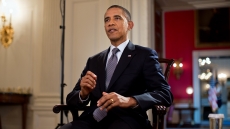EDUCATION
“If we want America to lead in the 21st century, nothing is more important than giving everyone the best education possible — from the day they start preschool to the day they start their career.”
Early Childhood Education
Expanding access to high quality early childhood education is among the smartest investments that we can make. Research has shown that the early years in a child’s life—when the human brain is forming—represent a critically important window of opportunity to develop a child’s full potential and shape key academic, social, and cognitive skills that determine a child’s success in school and in life.
Participation in high-quality early learning programs—like Head Start, public and private pre-K, and childcare—will provide children from disadvantaged backgrounds with a strong start and a foundation for school success. These programs also generate a significant return on investment for society; numerous economic studies have documented a rate of return as high as 18 percent on the program investment each year because of a reduced need for spending on other services, such as remedial education, grade repetition, and special education, as well as increased productivity and earnings for these children as adults.
President Obama’s comprehensive agenda invests in and strengthens early childhood education for our nation’s youngest children. It helps to prevent achievement gaps before they start, and invests from an early age in children as our most critical national resource.
Raising the Bar for Early Learning

The Obama Administration has invested more than $600 million in the Race to the Top: Early Learning Challenge (RTT-ELC), a new competition that challenges states to transform their early learning systems with better coordination, clearer learning standards, and meaningful education and training for early educators. This program represents an unprecedented opportunity for states to focus on early learning and development systems in their states and build a more unified approach to supporting young children and their families. The overarching goal of the Early Learning Challenge is to make sure that more children, especially those with high needs, enter kindergarten ready to succeed.
In the first year of the RTT-ELC competition, 35 states, D.C., and Puerto Rico developed and submitted ambitious plans to improve the system of early care and education in their states in order to prepare more children for kindergarten. Of these, nine states received funding (Washington, California, Minnesota, Ohio, North Carolina, Maryland, Delaware, Massachusetts, Rhode Island) totaling $500 million. In 2012, the Administration announced the availability of an additional $133 million in funding for five additional states (Oregon, New Mexico, Wisconsin, Colorado, and Illinois).
States awarded RTT-ELC funds are working on the following reform priorities:
- Developing successful state systems that support an ambitious early learning and reform agenda
- Building high-quality, accountable programs that align and raise standards for existing early learning programs, including Head Start, public pre-K, childcare, and private preschools, and provide information to parents about the quality of programs
- Promoting early learning and development outcomes for children, reflected in clear standards that detail what children should know and be able to do, and measured by comprehensive assessment systems
- Building a great early childhood education workforce, supported by strategies to train and retain quality teachers, providers, and administrators
- Measuring outcomes and progress, including the development of tools like comprehensive data systems and kindergarten entry assessments
Reforming and Expanding Head Start

Nearly 45 years after its inception, the Head Start program continues to represent one of the best investments to help our neediest children get a strong start in school and in life. Nearly one million children under the age of five benefit from Head Start services each year through grants provided by the Department of Health and Human Services directly to community-based agencies across the country. Head Start programs provide comprehensive child development services that foster children’s growth in social, emotional, cognitive and physical development, and monitor their progress in these areas to ensure that they are well prepared for kindergarten.The program makes it possible for the most vulnerable children in America to see doctors and dentists, obtain insurance, and receive immunizations against childhood diseases.
The Obama Administration has taken important steps to make Head Start services available to additional children. Through the American Recovery and Reinvestment Act, President Obama invested $2.1 billion in Head Start and Early Head Start, expanding these programs to reach over 61,000 additional children and families.
The President has also made reform of the Head Start program a high priority. Our Administration has implemented new efforts to raise Head Start’s standards, focus on school readiness results, and promote accountability, including the launch of a new process designed to ensure that only the most capable and highest quality programs receive Head Start grants.
Boosting the Quality of Child Care

Access to affordable, safe, quality child care is essential for parents who work: without it, many families are left with the untenable choice of leaving their children in substandard care, or risking loss of their jobs. Through the Child Care Development Fund, the federal government provides assistance to states to subsidize the cost of child care for low-income families and increase the supply, availability, and quality of that care. Nearly 1.6 million low income children and families receive assistance towards child care each month through this program.
The American Recovery and Reinvestment Act invested $2 billion in the Child Care and Development Fund to provide child care assistance for an additional 300,000 children and families during the height of the recession. These new investments also launched initiatives aimed at raising the quality of child care programs, empowering parents with information about the quality of child care programs, and providing pathways for the child care workforce for additional training and support. In the FY 2012 budget, President Obama outlined principles for the reauthorization of the Child Care and Development Block Grant and called for an additional $825 million in new investments to help transform our nation’s child care system to one that provides healthy, safe, and nurturing care to children while their parents work.
Empowering Parents

President Obama understands that families play the most important role in promoting the healthy development of their children, yet not all families are equipped with the information and support that help them create environments for their children to develop and learn.
The Maternal, Infant, and Early Childhood Home Visiting Program, created under the Affordable Care Act, provides $1.5 billion over 5 years in funding to expand evidence-based home visiting programs in states to serve the most vulnerable children and families. This program makes home visitors available to connect families to a range of services — including health care, early education, early intervention and more — to better ensure that children are healthy and prepared for school and life. Effective home visiting programs can have powerful positive impacts on maternal and child health, child maltreatment, children’s cognitive, language, and social-emotional development, and school readiness, and help parents develop the skills they need to support their children’s learning and development.
In addition, as part of the comprehensive child development services it provides, Head Start also provides services to families to support them in the important role of parent, as their child's first teacher.Head Start's family support approach recognizes that school readiness is a partnership between teachers and families, creating opportunities for parents to get the training and support they need to take a leadership role in the program, and in their children's education.













